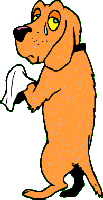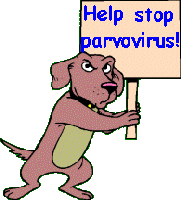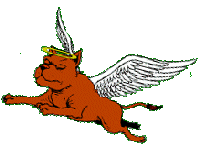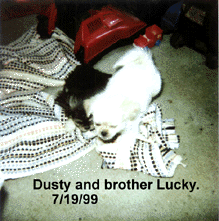



This information was taken from The Encyclopedia of Canine Veterinary Medical Information and also mixed with
information that I obtained through loss of other dogs as well as this one.


Therefore, I wish to inform as many people as I can about this deadly virus. See, I had given him his shots myself.
Which in itself isn't wrong or bad. But where I got the serum was. My Moms' local feed store carried it. So that's where I got
it. At the vets' office that fateful night, I was told that unless you get it from the vet, there is no gaurantee that it was
handled properly. Obviously, the shots I had given my baby weren't.

Parvovirus is a viral disease of dogs. It affects puppies much more frequently than it affects adult
dogs. The virus likes to grow in rapidly dividing cells. The intestinal lining has the biggest
concentration of rapidly dividing cells in a puppy's body. The virus attacks and kills these cells,
causing diarrhea (often bloody), depression and suppression of white blood cells -- which come
from another group of rapidly dividing cells. In very young puppies it can infect the heart muscle and
lead to "sudden" death. This is a very serious disease. Some puppies infected with parvovirus will die
despite prompt and adequate treatment. While no extremely accurate statistics are available, a good
guess is probably that 80% of puppies treated for parvovirus will live. Without treatment, probably
80% or more of the infected puppies would die.




Canine parvovirus is carried by dogs. Adult dogs may be infected carriers without showing any
clinical signs. Dogs with the typical diarrhea that parvovirus causes shed the virus as well. It can last a
long time in the environment, I have been told as long as one year. And although I was told that 4oz. of bleach to a half a gallon of water will help to disinfect,
there is really no way to get rid of it completely but time.
There is a parvovirus of cats, the panleukopenia virus. Researchers seem to think that this virus may
have mutated to become canine parvovirus. This is not a confirmed theory but there is some
supporting evidence for this. However, a cat can not "give" it to a dog. I always thought
they could, but that night, I was told otherwise.
It can be very hard to successfully vaccinate a puppy for
this disease because the antibody protection the puppy acquires from its mother can interfere with
vaccination. It is important to vaccinate puppies every three to four weeks for this virus starting at 6
weeks of age and continuing until they are at least 16 weeks of age and preferably 20 weeks of age.
It is possible that this vaccine confers lifelong immunity once it does work but most veterinarians
continue to recommend yearly vaccination for it. It seems prudent to at least get the vaccination at
one year of age. Since it is combined with the other vaccines it is often easier just to give it yearly
with them. If an animal does contract the virus and survives, yes, it can contract it again. Even with
boosters. Why is there such a terrible disease to torture such innocent animals????????











